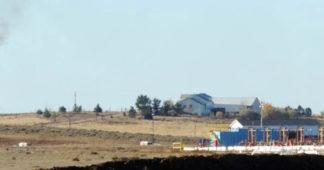The planet is ‘on the brink of an irreversible climate disaster,’ scientists warn
Earth’s climate in 2024 is “in a major crisis with worse to come if we continue with business as usual,” a team of 14 climate scientists warned in “The 2024 state of the climate report: Perilous times on planet Earth.” The report did not sugarcoat their view of the dangers humanity is facing.
“We are on the brink of an irreversible climate disaster,” the report begins. “This is a global emergency beyond any doubt. Much of the very fabric of life on Earth is imperiled. We are stepping into a critical and unpredictable new phase of the climate crisis.”
The report is the latest such annual peer-reviewed paper published in the journal BioScience by an international team of scientists led by Oregon State ecologist William Ripple.
The authors found that 25 of 35 “planetary vital signs” reached record levels last year, including global temperatures, human climate pollution, fossil fuel subsidies, heat-related mortality rates, meat production, and loss of forest cover.
After decades of warnings from climate scientists and efforts by some policymakers and activists, “the world has made only very minor headway on climate change, in part because of stiff resistance from those benefiting financially from the current fossil-fuel-based system,” it says. “We are currently going in the wrong direction and our increasing fossil-fuel consumption and greenhouse gas emissions are driving us toward a climate catastrophe. We fear the danger of climate breakdown.”
They did note a few positive indicators like clean energy production.
“Of course, the situation is not hopeless,” wrote Harvard science historian and study co-author Naomi Oreskes via email. “What we want people to understand is that, while there has been progress – particularly in the price and deployment of renewables – it’s not nearly enough. And the atmosphere does not respond to our intentions. It responds to chemistry.”
The report calls for “rapidly phasing down fossil fuel use” by ratcheting up the carbon price in wealthy countries and using some of the proceeds to fund policies to stop climate change and adaptation programs to reduce damage from climate disasters. It also urges sharp reductions in emissions of methane, a potent heat-trapping gas, to “slow the near-term rate of global warming, helping to avoid tipping points and extreme climate impacts.”
Without a course correction, the report warned, “climate change could cause many millions of additional deaths by 2050.”
Stressed planetary vital signs and scientists
Average global surface air and ocean temperatures shattered records in 2023, and are on track to do so again in 2024. The report notes that this extreme heat exacerbated numerous damaging and deadly extreme weather events over the past year, ranging from heat waves, droughts, and wildfires to hurricanes and floods.
Some other planetary indicators setting records over the past year include global sea level rise, ocean acidity and heat content, the amount of ice on Greenland and Antarctica and in glaciers around the world, and tree cover loss due to wildfires. Preliminary findings from another recent report made headlines for finding that Earth’s trees, plants, and soils absorbed almost no carbon in 2023 due in part to the year’s record wildfires. But climate scientist Zeke Hausfather noted that this phenomenon sometimes happens in years with El Niño events.
While human activity is responsible for long-term global warming, 2023 and 2024 were also influenced by an El Niño in the Pacific Ocean, which drew warm water up to the sea surface and contributed to short-term surface warming and associated climate impacts like droughts and wildfires in some regions.
Nevertheless, the report warned that human influence on Earth’s climate kept growing. Global fossil fuel consumption and associated climate-warming pollution reached record levels in 2023. So did the number of meat and dairy cattle and other ruminant livestock whose digestive processes generate planet-warming methane pollution, along with global per-person meat consumption.
The report also referenced a recent survey of climate scientists conducted by the Guardian in which more than three-quarters of the 380 respondents believed humanity will miss the target set in the Paris climate agreement of limiting global warming to less than two degrees Celsius above preindustrial temperatures.

There is some encouraging evidence of such decisive action, albeit at insufficient levels so far. Expert organizations like the International Energy Agency project that based on current climate policies, the world is headed toward around 2.5°C global warming by 2100. That’s not enough to meet the Paris climate targets, and yet implementing additional climate policies and solutions in the coming years could improve that outcome even further to levels below the worried expectations of three-quarters of climate scientists.
Any course correction depends largely on governments’ climate policy actions in the coming years, and the report includes some good news in this arena.
A few positive signs
For example, global renewable energy consumption reached record levels in 2023. The report notes that so far the increase in clean energy has only been sufficient to meet some of the world’s rising power demand, and fossil fuel consumption also reached record levels last year to meet the rest of that growing thirst for energy. But the persistent rise in fossil fuel combustion is finally poised to stop, as organizations like the International Energy Agency forecast that global coal, oil, and gas consumption will all peak within the next five years, and global climate pollution may be peaking right now.
The “State of the climate” report also notes that while the forest area lost to wildfires is reaching record levels, the level of global deforestation due directly to human activities in places like the Brazilian Amazon is declining due to government policies.
Among further indicators of successful climate action efforts, the amount of institutional assets divested from fossil fuels and the fraction of climate pollution covered by carbon pricing also reached record levels last year. In other words, fewer organizations are investing in fossil fuel company stocks, and more countries are charging a price for the climate-warming emissions from an increasing number of economic sectors.
“Only through decisive action can we safeguard the natural world, avert profound human suffering, and ensure that future generations inherit the livable world they deserve,” the report concludes. “The future of humanity hangs in the balance.”
The state of the climate is currently perilous, but humanity still has every opportunity to reduce the level of peril.
We remind our readers that publication of articles on our site does not mean that we agree with what is written. Our policy is to publish anything which we consider of interest, so as to assist our readers in forming their opinions. Sometimes we even publish articles with which we totally disagree, since we believe it is important for our readers to be informed on as wide a spectrum of views as possible.











